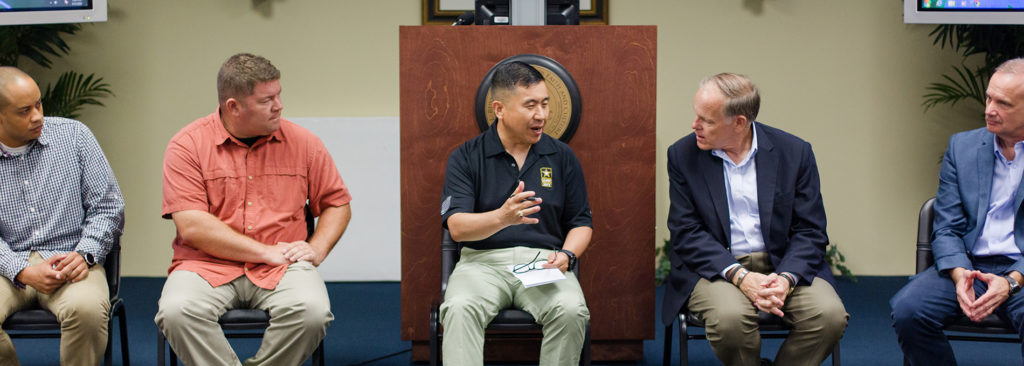Military Community Focus Week spotlights chaplaincy ministry and church planting efforts
Lauren Pratt | September 17, 2018

With approximately 105 military community students, Southeastern Baptist Theological Seminary (SEBTS) is making strides in its efforts to engage its military students and bring awareness to ministry opportunities within the military community.
Affiliated SEBTS military personnel and students gathered together for panel discussions and various meetings for the first ever Military Community Focus Week, Sept. 4-7.
“Discipling, training and caring for our military community is incredibly strategic for long term global, gospel impact,” said Mark Liederbach, dean of students and vice president for student services. “Our hope is to build a welcoming, strategic and caring community for our military men and women.”
In Wednesday’s panel discussing gospel flow points and church planting in military communities, panelists discussed ways in which strategic opportunities exist for churches to be planted near military bases and what it looks like for a church to minister in that context.
Bruce Ashford, provost at SEBTS and moderator of Wednesday’s discussion, asked panelists how churches can operate with intentionality in serving military families.
“You have to be intentional about reaching the military community and meeting the needs that they have, not the needs that you think they have,” explained Brian Collison, a church planter and pastor at Pillar Church of Woodlawn.
“The churches that tend to grow and the churches that tend to actually reach them are the ones that are truly preaching the gospel unashamedly,” said U.S. Army Chaplain Tim Stokes, who serves at Fort Bragg.
Thursday afternoon, another panel discussion was held for students interested in the types of expectations and experiences involved in chaplaincy ministry.
Jim Houck, coordinator of military affairs at SEBTS, opened the discussion by asking panelists what key distinctive features existed between chaplains and pastors.
As Doug Carver succinctly noted, “You live with the people that you serve.” Carver formally served as the U.S. Army’s 22nd Chief of Chaplains and was the first Southern Baptist appointed to this position in 50 years. He currently serves as the executive director of chaplaincy for the North American Mission Board (NAMB).
Panelists also discussed the importance of building relationships with fellow service members for the sake of the gospel.
As Thomas Watson asked, “Are we building the relationships to have the credibility and opportunity to speak into people’s lives?”
“I’m a missionary in uniform just like we send missionaries to the 10/40 window,” said Watson, who serves as a North Carolina National Guard chaplain and with the North Carolina Baptist State Convention in military ministry. “I went too, but I went in uniform.”
One attendee asked panelists how they are mentored and find people of like-mindedness to keep them grounded.
For Chuck Gilbertson, a chaplain for the U.S. Army, this looked like coming to Southeastern.
“Coming to Southeastern is, for me, that chance to [re-focus] spiritually,” said Gilbertson.
This type of spiritual refresher that Gilbertson has found at Southeastern is just the sort of ministry Houck and others at the school have discussed providing for military personnel at SEBTS. An executive session on ministry to the military was held Tuesday afternoon with both internal SEBTS leaders and external military partners along with a strategy meeting Friday morning. One of the ideas discussed involved providing focused opportunities where military personnel can come together and be spiritually refreshed.
U.S. Army Chaplain Samuel S. Lee, command chaplain to U.S. Forces Korea, Combined Forces Command and the United Nations Command, facilitated a discussion on Friday afternoon on the foundation and relevancy of military ministry. The discussion centered around understanding the importance of military as professionalism, the character qualities that should be found in a chaplain and the vital role spouses play in chaplaincy ministry.
Multiple speakers from the week shared their thoughts on the value and what they hope to see come out of a week like Military Community Focus Week.
Carver described the outcome as three-fold: familiarizing students with the ministry of chaplains, creating awareness of the growing opportunity for church planting near military communities both nationally and internationally and discussing ways SEBTS can more intentionally reach out to veterans and their families in the community.
“I believe that Southeastern is on the verge of becoming the “gold standard” for strategic military ministry initiatives,” said Carver.
For Samuel Lee, he hopes that everyone gained “a healthy dose of respect for one another and [a] reminder of our calling for the sake of gospel to those who serving our country.”
John Scanlon, who currently serves as a Navy chaplain programs officer and works with a predominantly younger demographic, said his hope for SEBTS students is that they will see military ministry as “a young mission field, to have a burden for the military community as a people group with unique values, challenges and culture and to know there is a disciple making, gospel opportunity.”
“I believe this week can be a launching pad for God raising up the next generation of leaders within military ministry,” said Bill Gandy, a collegiate military missionary for the U.S. Air Force Academy.
Endel Lee, the Navy Deputy Chief of Chaplains for reserve matters as well as the church planting catalyst for military communities for the NAMB, desires for students would be “gripped with the realization that military members and their loved ones are certainly in need of the gospel, are open to its truths and could serve as a conduit for influencing worldwide spiritual revitalization.”
The week concluded with a dinner for all military personnel and their families in the Ledford Center Event Room.
To view photos from Military Community Focus Week, click here.